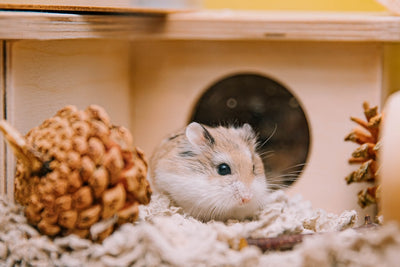The Ultimate Guide to Live Food for Reptiles

Providing a diverse, nutritious diet is crucial for your reptile's overall health and well-being. Live food offers essential nutrients, simulates natural feeding behaviors, and contributes to the physical and mental stimulation of your pet. This guide will help you navigate the world of live food for reptiles, covering topics such as the different types of live food, proper care and storage, and the specific nutritional needs of various reptile species.
Introduction
Live food plays a crucial role in a reptile's diet, offering essential nutrients and promoting natural hunting and foraging behaviors. This introduction will provide an overview of the different types of live food suitable for reptiles, setting the foundation for a comprehensive understanding of their dietary needs and how to meet them.
The importance of live food in a reptile's diet cannot be overstated. Many reptiles are obligate carnivores, meaning they require animal-based foods to thrive. In addition to providing essential nutrients such as protein, vitamins, and minerals, live food also helps stimulate a reptile's natural hunting instincts and encourages physical activity.
There are a variety of live food options available for reptiles, each catering to the specific dietary requirements of different species. Understanding the types of live food suitable for your reptile is essential to ensure their optimal health and well-being. Some of the most common live food options include insects, worms, grubs, and even small rodents. It is important to research your reptile's specific dietary needs and preferences to provide the most appropriate and nutritious live food options.
Types of Live Food for Reptiles
Live food is a crucial aspect of a reptile's diet, providing essential nutrients and promoting natural behaviors. There are various types of live food available for reptiles, such as insects, worms, grubs, and live rodents. In this section, we will discuss the different types of live food and their benefits for reptiles.
Insects
Insects are a common choice for live food, offering a variety of options to meet the nutritional needs of various reptile species. Some popular insects used as live food for reptiles include:
- Crickets: These insects are an excellent source of protein and readily available in most pet stores. They are suitable for many reptiles, such as lizards, frogs, and turtles.
- Roaches: Roaches, like the Dubia roach, are another protein-rich option for reptiles. They are easy to breed, making them a sustainable and cost-effective choice for live food.
- Mealworms: Rich in protein and fat, mealworms serve as a nutritious live food option for reptiles such as geckos, bearded dragons, and chameleons.
- Superworms: Similar to mealworms, superworms are high in protein and fat. They are larger in size, making them suitable for bigger reptiles like monitor lizards and adult bearded dragons.
Worms and Grubs
Worms and grubs provide another live food option for reptiles, offering unique nutrients and a different texture for reptiles to enjoy. Some popular choices include:
- Waxworms: These soft-bodied worms are high in fat, making them an excellent treat for reptiles needing a boost in energy or weight gain. Waxworms are ideal for geckos, chameleons, and small snakes.
- Earthworms: Earthworms are a protein-rich live food option that can be fed to various reptile species, including aquatic turtles, frogs, and salamanders. They can be found in gardens or purchased from bait shops and pet stores.
Live Rodents
Live rodents, such as mice and rats, are suitable live food options for carnivorous reptiles like snakes. These rodents provide essential nutrients, including protein, vitamins, and minerals. However, it is essential to ensure that the rodents are appropriately sized for your reptile and are humanely bred and raised.
Proper Care and Storage of Live Food
When it comes to keeping live food for your reptiles, proper care and storage are essential to ensure the health and well-being of both the feeder animals and your pet reptiles. By following these guidelines, you can provide a nutritious and safe diet for your reptilian friends.
Keeping Live Insects
When storing live insects, it is crucial to house them in tight enclosures to prevent escape. Providing a nutritious diet for the insects, a process known as "gut loading," is also essential as it enhances their nutritional value for your reptiles. Additionally, keeping the insects hydrated by offering a water source will help ensure their health. Finally, dusting the insects with supplements before feeding them to your reptiles can help meet your pets' specific nutritional requirements.
Keeping Live Worms or Grubs
Live worms or grubs, such as waxworms and earthworms, require proper temperature and humidity conditions for optimal health. Providing a suitable environment, along with an appropriate diet, will result in well-nourished and healthy worms or grubs for your reptiles to consume. Gut loading these creatures is also essential to maximize their nutritional benefits for your pets.
Keeping Live Rodents
If you choose to keep live rodents as food for your reptiles, maintaining proper housing and sanitation is crucial to prevent the spread of disease. Providing adequate space, clean bedding, and a balanced diet for the rodents will ensure their health and well-being. Additionally, it is essential to provide water for hydration and monitor the rodents' health regularly.
In conclusion, proper care and storage of live food are vital to providing a nutritious diet for your reptiles. By following these guidelines, you can ensure the health and well-being of both the feeder animals and your pet reptiles, resulting in a thriving and happy environment for all.
Feeding Live Food to Reptiles
When it comes to feeding live food to reptiles, it is essential to consider the frequency and quantity of feeding. Each reptile species has its specific dietary requirements, and their feeding schedules may vary. For instance, some reptiles need to be fed daily, while others can go for a few days or even weeks without eating. It is crucial to research the specific needs of your reptile and provide the appropriate amount of live food.
Monitoring your reptile's response to live food is also important. Observe your pet's behavior and appetite during feeding sessions. If your reptile is not eating, it could be due to stress, illness, or an inappropriate environment. In such cases, seek advice from a reptile specialist or a veterinarian.
Safe feeding practices are essential when offering live food to your reptile. For example, use feeding tongs or forceps to prevent accidental bites and injuries to both you and your pet. Additionally, ensure that the live food is an appropriate size for your reptile to avoid choking hazards. It is also a good idea to feed your reptile in a separate enclosure to minimize the risk of substrate ingestion, which can lead to impaction.
While live food is an essential part of many reptile diets, it is worth considering alternatives such as dry, freeze-dried, and canned options. These options can provide additional variety and convenience, without compromising on nutritional value. However, it is crucial to choose products specifically formulated for your reptile species to ensure they meet their unique dietary needs.
Understanding the Nutritional Needs of Different Reptile Species
When it comes to feeding reptiles, it's crucial to understand the unique nutritional requirements of each species. A well-balanced diet can significantly impact your pet's health and well-being. In this section, we'll explore the dietary needs of various reptiles, including aquatic turtles, lizards, frogs, tortoises, bearded dragons, hermit crabs, iguanas, chameleons, geckos, and snakes.
Aquatic Turtles
Aquatic turtles require a diet that is high in protein, vitamins, and minerals. They thrive on a mix of live food, such as small fish, insects, and worms, as well as commercial turtle pellets. Calcium supplements are also essential for their shell health.
Lizards
Lizards have diverse dietary needs depending on their species. For example, green iguanas are primarily herbivorous and need a diet rich in leafy greens, fruits, and vegetables. In contrast, bearded dragons require a combination of live insects, vegetables, and fruits to meet their nutritional demands.
Frogs
Most frogs are insectivorous and thrive on a diet of live insects, such as crickets, mealworms, and fruit flies. Some larger species may also consume small vertebrates like mice. Always ensure that the insects you feed your frog are appropriately sized to avoid choking hazards.
Tortoises
Tortoises are primarily herbivorous, and their diet should consist of a variety of leafy greens, vegetables, and fruits. It's essential to provide them with adequate calcium and vitamin D3 supplements to maintain healthy shell growth and avoid metabolic bone disease.
Bearded Dragons
Bearded dragons are omnivorous and require a balanced diet of insects, vegetables, and fruits. Juvenile bearded dragons need more protein, so their diet should consist of a higher percentage of live insects, while adult dragons should consume more vegetables and greens.
Hermit Crabs
Hermit crabs are scavengers and eat a varied diet, including fruits, vegetables, and protein sources such as fish, shrimp, and insects. Commercial hermit crab food can also be used, but it's essential to supplement it with fresh foods to provide proper nutrition.
Iguanas
Green iguanas are primarily herbivorous and require a diet rich in leafy greens, vegetables, and fruits. Calcium and vitamin D3 supplements are necessary to maintain healthy bones and prevent metabolic bone disease.
Chameleons
Chameleons are insectivorous and need a diet of live insects such as crickets, mealworms, and waxworms. Gut loading and dusting insects with calcium and multivitamin supplements are essential to provide chameleons with the necessary nutrients for proper growth and development.
Geckos
Geckos are primarily insectivorous, but their specific dietary needs vary depending on the species. For example, crested geckos can consume a commercial diet of fruit and insects, while leopard geckos thrive on a diet of live insects like crickets and mealworms.
Snakes
Most snakes are carnivorous and require a diet of whole prey items, such as rodents or birds, depending on the species. It's essential to feed snakes appropriately sized prey to prevent choking hazards and ensure their nutritional needs are met.
In conclusion, understanding the nutritional needs of different reptile species is crucial for ensuring their health and well-being. A well-balanced diet, tailored to your pet's specific requirements, will help them thrive and live a long, healthy life.
Reptile Care and Health Products
When it comes to reptile care, several essential products ensure the health and well-being of your scaly friend. In this section, we'll discuss the importance of thermostats and thermometers, water supplies, lights, hoods, fixtures, and heat sources for maintaining a comfortable and safe environment for your reptile.
Thermostats and Thermometers: Regulating the temperature in your reptile's habitat is crucial for their overall health. Thermostats and thermometers allow you to monitor and control the temperature, ensuring that it stays within the ideal range for your specific reptile species. Maintaining a consistent temperature also helps with digestion and proper metabolic function.
Water Supplies: Providing clean and fresh water is essential for your reptile's hydration and overall health. Some reptiles, such as certain turtle species, require a more elaborate water setup, including a filtration system to maintain water quality. Others may need a simple water dish that is regularly cleaned and refilled. It's important to research the specific water requirements for your reptile species and provide the necessary supplies to meet their needs.
Lights, Hoods, and Fixtures: Reptiles require appropriate lighting to thrive in their environment. Some species, like bearded dragons and iguanas, need UVB lighting to help them synthesize vitamin D3, which is essential for calcium absorption. Other species may require UVA lighting to regulate their circadian rhythm and maintain a healthy sleep-wake cycle. Research the specific lighting needs of your reptile species and invest in the proper lights, hoods, and fixtures to ensure their well-being.
Heat Sources: Reptiles are ectothermic, meaning they rely on external heat sources to regulate their body temperature. Providing an adequate heat source is essential for maintaining your reptile's health, digestion, and overall well-being. There are various heat sources available, such as heat lamps, heat mats, and ceramic heat emitters. It's crucial to choose the appropriate heat source for your reptile species, taking into account their natural habitat and temperature preferences.
In conclusion, investing in essential reptile care and health products is vital for ensuring the happiness and health of your scaly companion. By providing the appropriate temperature, lighting, and water supplies, you can create a comfortable and safe environment that meets the specific needs of your reptile species.
Proper Reptile Housing
Creating a comfortable and safe environment for your reptile is crucial for their health and well-being. Proper reptile housing includes choosing appropriate terrarium substrates, habitats, and cages, as well as stands and starter kits. Each of these elements plays a vital role in ensuring your reptile thrives in its new home.
Terrarium Substrates: The choice of substrate, or the material that lines the bottom of the terrarium, is essential for maintaining cleanliness, humidity, and temperature control. Different reptile species have specific requirements when it comes to substrates. For example, desert-dwelling reptiles, like bearded dragons, may require a sand-based substrate, while tropical species may need a moisture-retaining substrate like coconut fiber. It's crucial to research the specific needs of your reptile and choose the appropriate substrate accordingly.
Habitats and Cages: The size, shape, and design of a reptile's habitat or cage should be tailored to its unique needs. Arboreal reptiles, such as chameleons or tree-dwelling geckos, require vertical space for climbing, while terrestrial reptiles like tortoises need more horizontal space. It's important to choose a habitat that provides adequate space for your reptile to move around and explore, as well as appropriate hiding spots and basking areas. Additionally, proper ventilation and secure doors or lids are essential to prevent escapes and ensure your reptile's safety.
Stands and Starter Kits: Stands and starter kits can be beneficial for first-time reptile owners looking to set up a suitable environment for their new pet. Stands provide a stable and secure base for your reptile's habitat, while starter kits often include essential items such as heat sources, lighting, and thermometers. These kits can be a convenient way to ensure you have all the necessary components for a safe and comfortable reptile home, but it's essential to research the specific needs of your reptile species to ensure the kit meets all their requirements.
In conclusion, investing time and effort into creating the proper reptile housing will greatly contribute to your pet's overall health and happiness. By selecting appropriate terrarium substrates, habitats, and cages, as well as utilizing stands and starter kits, you can create a safe and comfortable environment for your reptile to thrive.
Benefits of Shopping for Reptile Food and Supplies Online
As reptile owners look to provide the best care and nourishment for their pets, shopping for reptile food and supplies online offers a range of advantages. The convenience and accessibility of online shopping mean that you can easily browse through a wide variety of products, compare prices, and make informed decisions about the food and care items you need for your reptile.
One of the key benefits of shopping online is the ability to find promotions and discounts on selected items. These offers can help you save on essential supplies without compromising on quality. By taking advantage of these deals, you can ensure your reptile has the live food and care products they need to thrive while staying within your budget.
Moreover, shopping online allows you to access a broader range of products that may not be available in your local pet store. This means that you can find specialized items, such as live food reptiles, and cater to the unique nutritional needs of your pet, ensuring they receive a diverse and balanced diet.
In conclusion, shopping for reptile food and supplies online offers many benefits, including convenience, accessibility, and the potential for discounts on selected items. By choosing to shop online, you can provide your reptile with the diverse and nutritious diet they need while saving time and money.
Unlock Reptile Bliss
Providing a diverse and nutritious diet is essential for your reptile's health and well-being. Live food plays a crucial role in meeting the dietary needs of various reptile species. From insects to rodents, understanding and caring for live food ensures your pet's vitality. In addition to live food, consider exploring other food options, such as dry, freeze-dried, and canned products, to meet your reptile's nutritional requirements. To make reptile care easier, Talis-us offers a wide range of products, including reptile housing and health essentials. Explore a comprehensive range of reptile food and care products and unlock the bliss of reptile care today.






